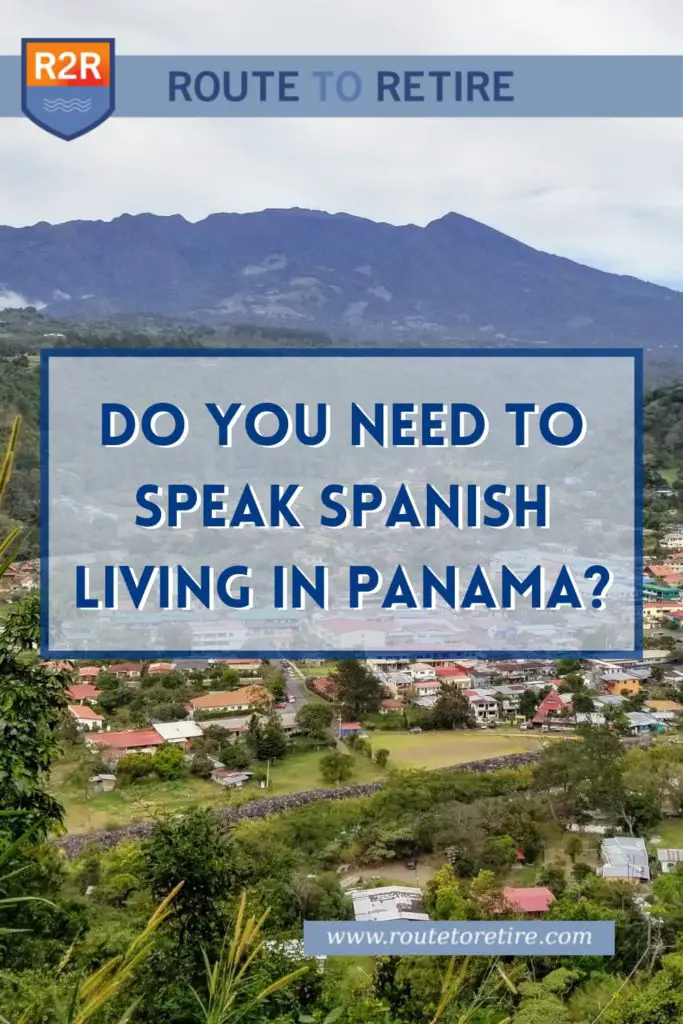
If you’re an English-speaker in a country like Panama and don’t speak Spanish well, you’ll find yourself saying things like this quite a bit to strangers:
¿Habla usted Inglés? or ¿Hablas Inglés?
Both sentences are asking “Do you speak English?” with the first being a little more formal. Either iteration tends to get the point across though… you don’t speak Spanish well and you’re praying the other person does.
Generally here in Boquete, Panama, the response will be “no”… and hopefully you can figure out what that Spanish word means! In some cases though, you might get a little luckier with hearing “un poco”, which means “a little.” In either case, that’s likely when you both start smiling because you know that the rest of the attempted conversation is going to be interesting.
So the question is, do you need to speak Spanish while living in Panama? And if so, how do you learn it?
Does everyone in Panama speak Spanish?
As I stated in the intro, most folks here in Boquete, Panama speak Spanish. It’s the official language and you shouldn’t expect otherwise. If you want to be welcomed more openly, learning at least a little bit of the language is a sign that you’re trying to fit in more.
Don’t be the jackass who rolls their eyes and gets frustrated because someone doesn’t speak English. You’re a guest in their country – if you don’t speak Spanish and don’t want to put in the effort, then don’t get upset if you can’t communicate well. Suck it up and accept it graciously or take the time to learn the language.
Now with that said, one of the things I love about Boquete is that most of the locals here work with you to try to communicate… especially if you attempt to speak even a little bit of Spanish. In some cases, the discussion might involve a couple of Spanish words you know or that they might know in English. Other times, it might be a game of charades or pointing.
I look at it as a fun game and actually enjoy these conversations. It’s amazing to me just to be able to communicate with someone speaking a completely different language.
Somehow though, it seems like you’ll be able to understand each other to some degree almost all the time… with an emphasis on “almost.”
So that’s the majority of cases here, but once in a great while you’ll find a local here who does speak English pretty well. I love that but not for the reason you might think. Sure, it’s easier to have a discussion in a language you’re more familiar with using.
However, I like that I can practice my Spanish with them and they can tell me what I’m saying incorrectly… it’s a great learning opportunity for me! Usually, we both get a couple of laughs and I’m happy making a new friend.
The other factor that can come into play is where you live. Boquete is one of the largest expat communities in Panama. If you live in a neighborhood that’s mostly expats, you’ll find that a lot of those folks speak English.
That’s both a pro and a con. We moved to Valle Escondido for several reasons but making that the first foreign place we’d live would also make the transition easier. Having folks around who speak the same language as you can be a lot less frustrating while adjusting.
But on the flip side, it’s mostly isolated from the Panamanians. That means that we’re not speaking a lot of Spanish unless we’re in town or out and about. One of the goals we had when moving here was to learn more about the Panamanian culture and that’s harder for us to do when we’re not in the middle of it.
Do I speak Spanish?
Estoy aprendiendo a hablar español, pero no soy muy bueno. I’m learning to speak Spanish, but I’m not very good.
I took a couple of semesters of Spanish back in high school and I have to give credit to my teachers back then – Mrs. Boyarski and Mr. Felinski. A lot of that foundation I had has made it easier in remembering some words and phrases, understanding noun genders, and conjugating verbs.
That said, as confident as my brother (who also took Spanish in school) and I were when our families visited Panama together in 2017, we realized that we were fighting a losing battle in trying to regurgitate the Spanish we had learned decades earlier. We failed miserably at more than one discussion while there!
I decided then that if we moved to Panama, I’d like to learn to speak Spanish better. So that’s what I started doing once we decided to make this adventure happen.
A handful of months before we moved to Boquete, Panama in the summer of 2019, I started learning the language slowly but surely. I have a lot of work to do in that respect, but I continue to feel more and more comfortable in having basic conversations with Panamanians here. I still struggle quite a bit (especially with as fast as they speak) but my skills are growing more every day.
How I’m learning Spanish
Because I already had somewhat of a base with the Spanish I learned in high school, I decided to learn without a tutor… at least for now.
So I started with a few apps, moved into an online pre-recorded course, and have plans to continue with other avenues of learning down the line. I haven’t felt the need to spend any money on learning to speak Spanish yet. The free options I’ve found so far have been plenty sufficient.
However, I’m not opposed to that either. Our daughter, Faith, had been going to a tutor every week (until the pandemic hit). More on that shortly.
Here’s what I’ve been using on my quest to learn to speak Spanish…
Drops
Drops is a pretty cool app. The whole idea is that you learn Spanish in small “drops” of time – 5 minutes per day.
The app teaches you a ton of different words along with some phrases and grammar. You learn the words through a bunch of small quizzes like matching games, spelling, true or false type scenarios, etc…
These little quizzes are easy enough to figure out and you do different ones over and over. It’s easy to work with and very helpful in the learning process.
As of last Friday, I haven’t missed a single day of doing Drops in 435 days!
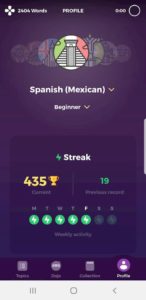
I’m getting close to completing the entire Drops curriculum. I should be done within the next few weeks.
Although the free version has been good enough for my purposes, there is a premium version available. That version varies in price and gives you additional extras such as unlimited time, offline access, no ads, and the ability to review words at any time.
More info: Drops website
Duolingo
Duolingo is probably one of the most well-known apps for learning a new language. It’s very well done and probably the best app I’ve used for learning full sentences and grammar.
I don’t know if I’ll ever get through this whole app. I’ve been doing this almost every single day for well over a year now and I’m probably only about a third of the way through it! That’s good in that they have so much content, but for a check-it-off-the list, OCD-like personality like mine, I appreciate a finish line.
I’ll get there – it’s just going to take a while. As I finish up on other apps, I’ll be doubling down on Duolingo to try to crush it even faster. Similar to Drops, you go through each lesson by just doing some questions and other challenges…
Duolingo is completely free but there is a premium version available called Duolingo Plus. It offers additional benefits such as an ad-free experience and offline access.
More info: Duolingo website
Memrise
I started the Memrise app a little bit after Drops and Duolingo.
This one threw me off a little bit though because at some points the content was so much harder than the content in the other apps – I’m talking about really complicated sentences you’re expected to become familiar with. But other times, it was right on par with the difficulty level you’d find in the others.
Still, it was some solid learning and I appreciated the challenge. Like the others, you just repeat different challenges or puzzles to make your way through each course. Over time, the words and phrases just get ingrained in your head.
I completed the Memrise course a few weeks ago – that was a good feeling of accomplishment! Seven levels of learning to speak Spanish… done!
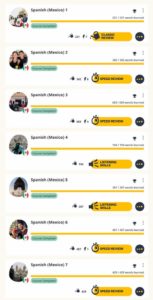
Similar to the other apps, I used the free version but there are some premium features available if they serve you well.
More info: Memrise website
The Great Courses: Learning Spanish
The downside to the various apps is that they just give you words and sentences and help you to basically memorize them. That’s great to a point, but learning the “whys” and “how-tos” can be more effective. In that regard, an online course to learn to speak Spanish is the next best thing to a live tutor.
While digging around one day last year on our U.S. library’s online offerings, I found that they had a Spanish course available…
Learning Spanish: How to Understand and Speak a New Language taught by Professor Bill Worden. He’s an associate professor of Spanish at The University of Alabama.
This Spanish level-1 class has 30 lectures with each being around 35-45 minutes. That’s over 20 HOURS of material on learning how to speak Spanish!
Now, if you click on the link above, you’ll see that the course is around $335… ouch!
It’s taken me some time to get through it and digest it all and I can tell you that the price isn’t unjustifiable, but getting it for free through the library makes it an even better deal!
I just finished the entire course a couple of days ago. I learned a lot but I will say that the last few lessons on past tense (preterite) verbs were a bit overwhelming. I’ll definitely need to revisit those lessons again.
I had so many “a-ha” moments of why things are said a certain way in Spanish that this course was well worth it. I can’t guarantee your library has “The Great Courses” available to you or this class in particular, but you’ll likely find it valuable if they do.
Talking to others in Spanish
This is the most beneficial way to learn to speak Spanish, in my opinion. You become fully immersed in real-life settings, have to listen more closely because they talk faster, and have to adjust to different dialects.
But even better is that you get feedback on if you’re screwing up completely. Apps can’t give you a weird look if you’re pronouncing words slightly off. And if you start talking to a bilingual Panamanian, that’s an even better bonus! Being able to hear feedback in English on what you’re botching is extremely valuable.
I’m used to being the guy making conversation with strangers so why not do it here as well? Current lockdown excluded, I try to talk with Panamanian taxi drivers, store employees or customers, restaurant servers, etc. A little small talk can bring a smile to others while giving me the chance to practice a little more.
And so on…
I’m probably going to add Rosetta Stone to my list of learning tools to make my way through. Although this is a pay-only subscription, I found out that I can access it online through the library for free. The downside is that I think it only works using it through their website and not the app, but I’ll cross that bridge when I get to it.
Other than all of the above, I plan to start watching the Panamanian news. Several folks have told me that this is a very smart way to learn to speak Spanish. The reason is that newscasters have a tendency to speak slower, more clearly, and annunciate their words.
Will all these apps, the course, and being more immersed in Spanish make me fluent? I doubt it. That’s a process that can take years of training and I don’t anticipate reaching that level.
But just being able to have some conversations a little deeper than “my name is Jim” and “how are you?” makes it worthwhile.
UPDATE 12/08/20: I’ve completed Drops, Memrise, and The Great Courses (both Spanish I and II). I’m still working my way through Duolingo but that’ll take a while to complete. However, I recently started digging into Language Transfer and have to say that I think this is an excellent asset. It would be great for anyone just starting down the path of learning to speak Spanish.
It’s completely free and is done differently from all the others. It’s all audio and the instructor, Mihalis, walks a student through learning the language. Instead of memorization, he focuses on teaching you how to understand the language conceptually. I’m only about 20 lessons in (there are 90) but I’m learning quite a bit already. I imagine things will get harder but I like where this is going so far and think it’s a great option to start with.
The key is that you can’t try to do other things while listening – you really need to concentrate on what he’s saying and you’ll take a lot away from it.
UPDATE 01/11/21: I just finished all 90 lessons in Language Transfer. This is an excellent program to learn to speak Spanish and doesn’t cost you a cent (they do accept donations though). I’d highly recommend it for anyone looking to self-teach themselves the language. It’s not an end-all-be-all, but it will get you off to a great start.
Is the rest of the family learning to speak Spanish?
I was lucky to have that foundation with Spanish back in high school. It’s made learning to speak Spanish much easier.
My wife, Lisa, and our daughter, Faith, haven’t had that benefit though.
Faith was going to a Spanish tutor here in Panama every week as part of her homeschooling. That’s been helpful for her but we had to stop that when they went into lockdown mode here during the COVID-19 fun. Once the restrictions loosen up, she’ll resume classes.
In the meantime, she’s still moving slowly forward. She continues to practice a lot of the words and homework her tutor had given her and does Duolingo a few times a week.
My favorite though is that she watches the Netflix original show The Boss Baby: Back in Business. This is a 3-season cartoon based on the movie and Faith knows almost every episode by heart. So she watches the show in Spanish a few times a week. Since she knows the English version inside and out, hearing it in Spanish is helping to build her skills as well.
Lisa was going to the same tutor as Faith but stopped going a while ago. She’s watched a couple of lectures of the Learning Spanish class in the Great Courses but didn’t appreciate it as much as I did. So now she’s spending a lot of time focusing on Drops and Duolingo.
So, do you need to speak Spanish while living in Panama? No, there are many expats living here who don’t speak Spanish and get by just fine. I’m good with that unless you’re the complainy-pants who whines about the language barrier.
But the better question is “should you learn to speak Spanish while living in Panama” and that will depend on you. It’s definitely harder to learn new things like a language as you get older but I also think it’s worth it. Being able to communicate effectively with others can not only make life a lot easier, but it also paves the way for making new friendships in life.
Do you speak Spanish? Would the language barrier keep you from visiting or living in a country where Spanish is the primary language spoken?
Thanks for reading!!
— Jim

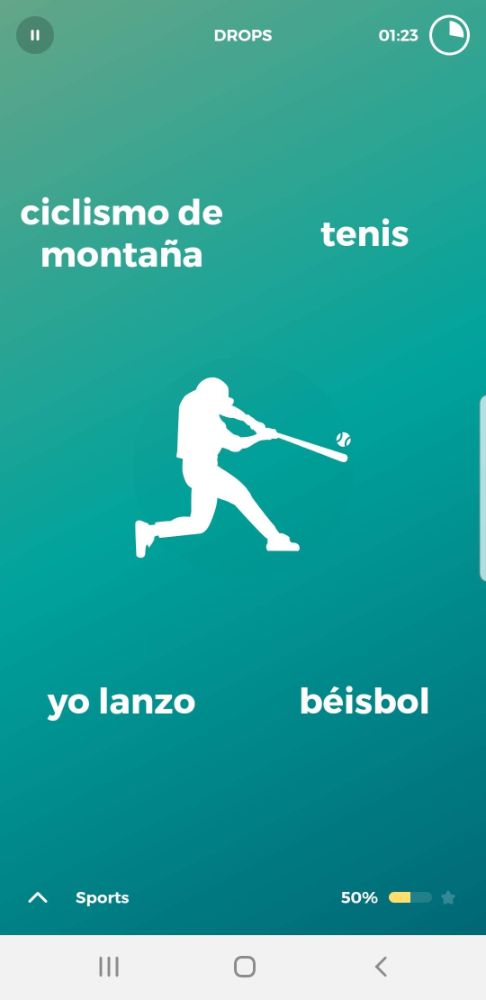
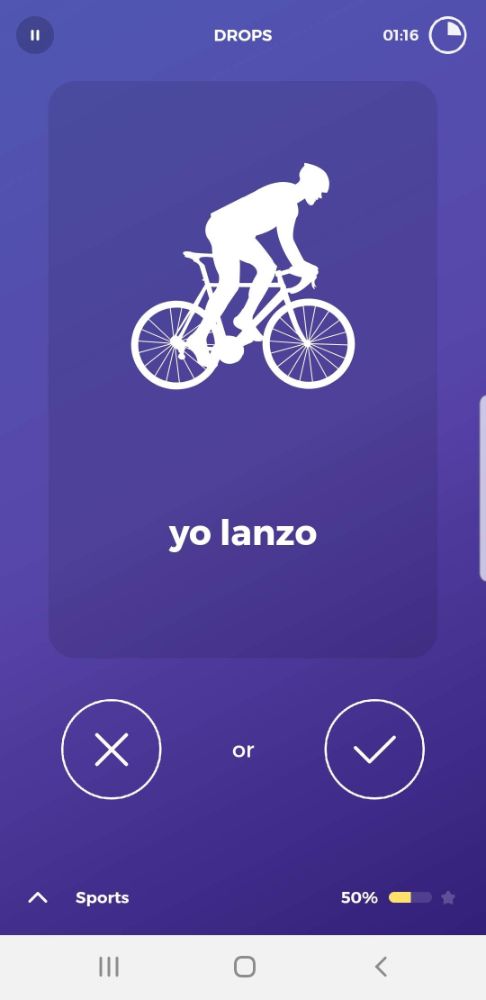
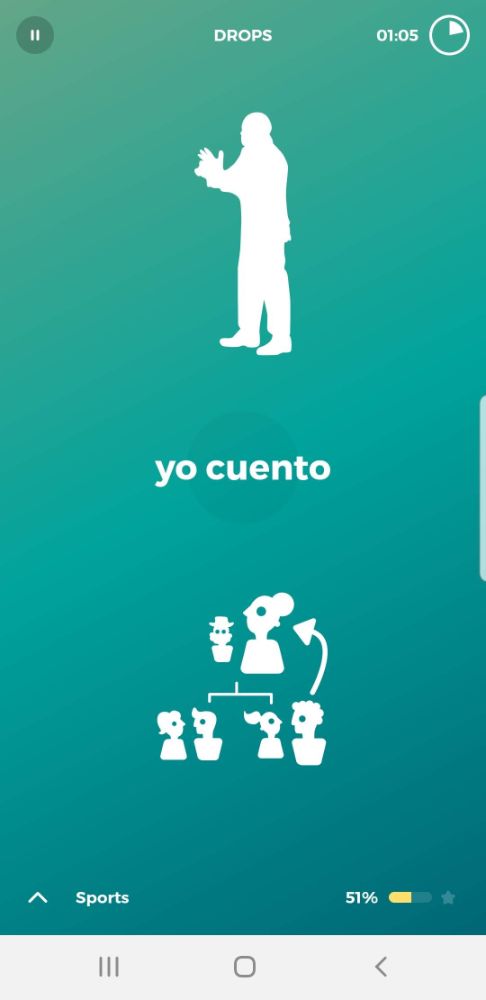
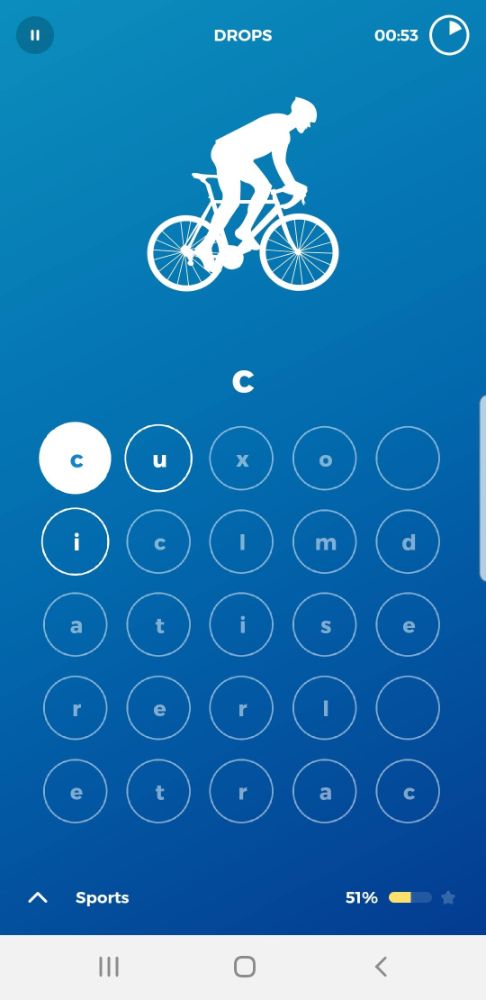
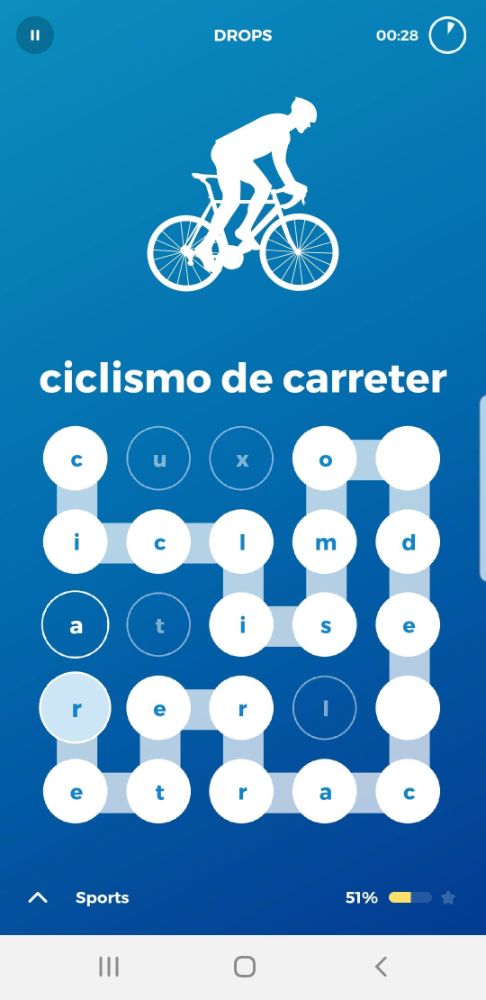
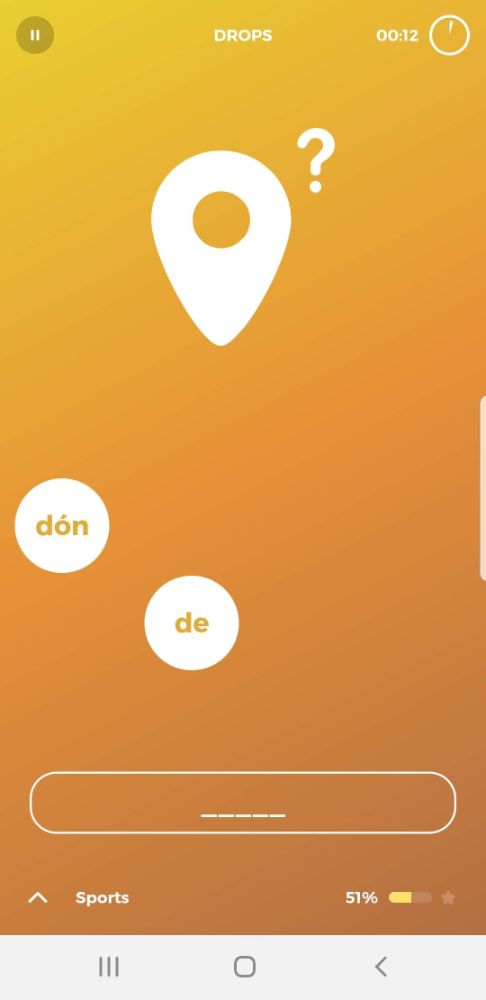
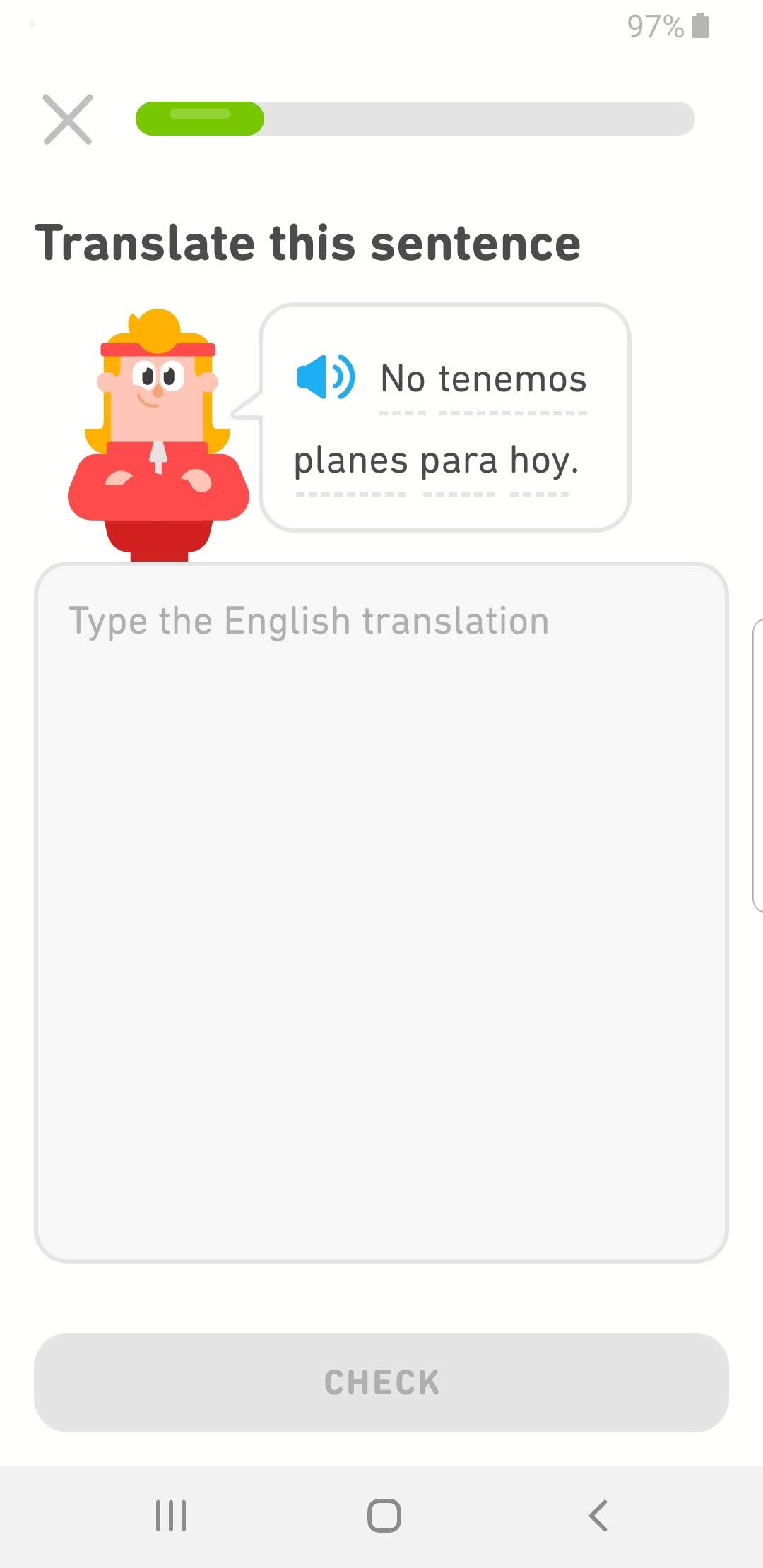
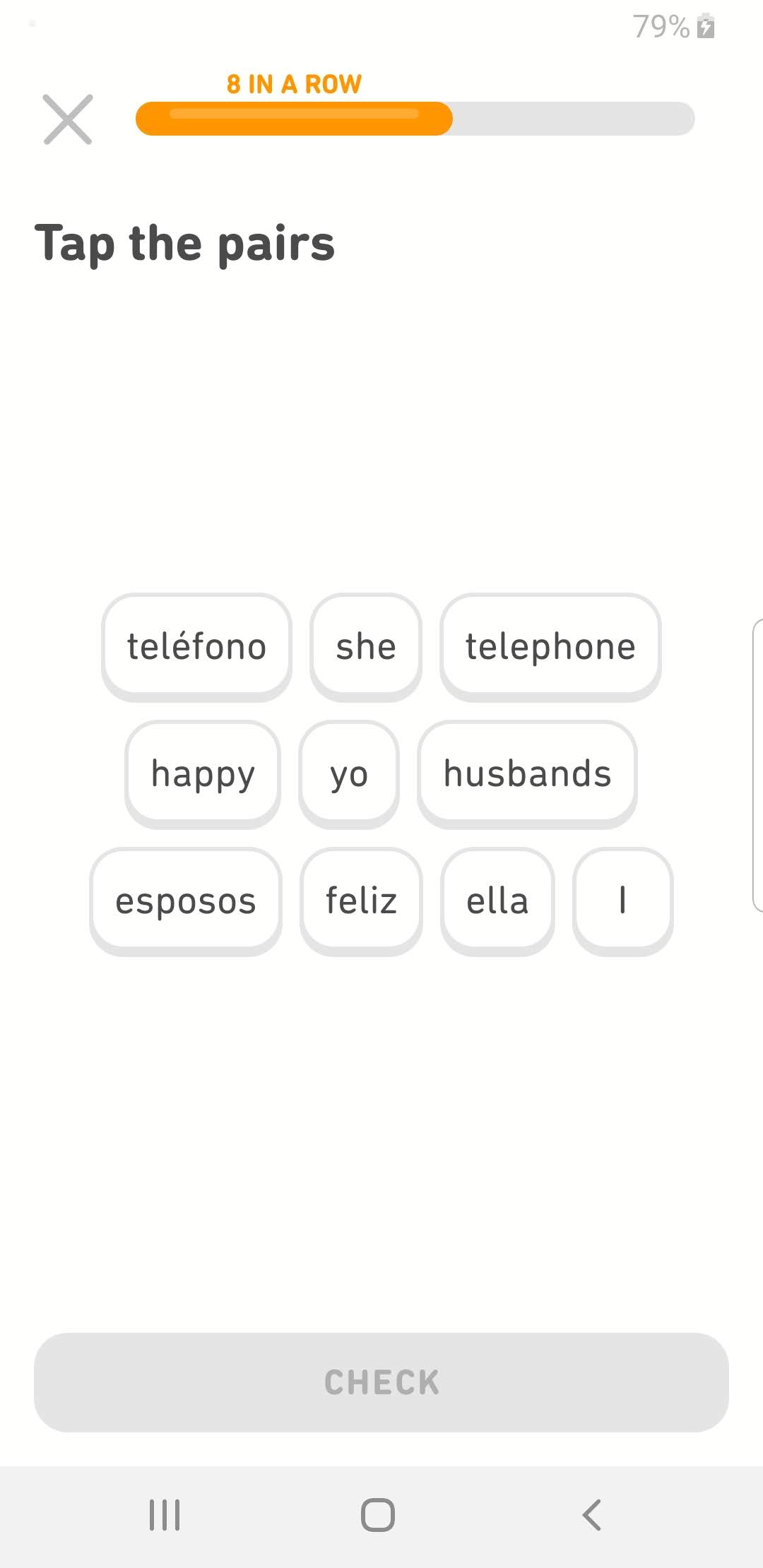
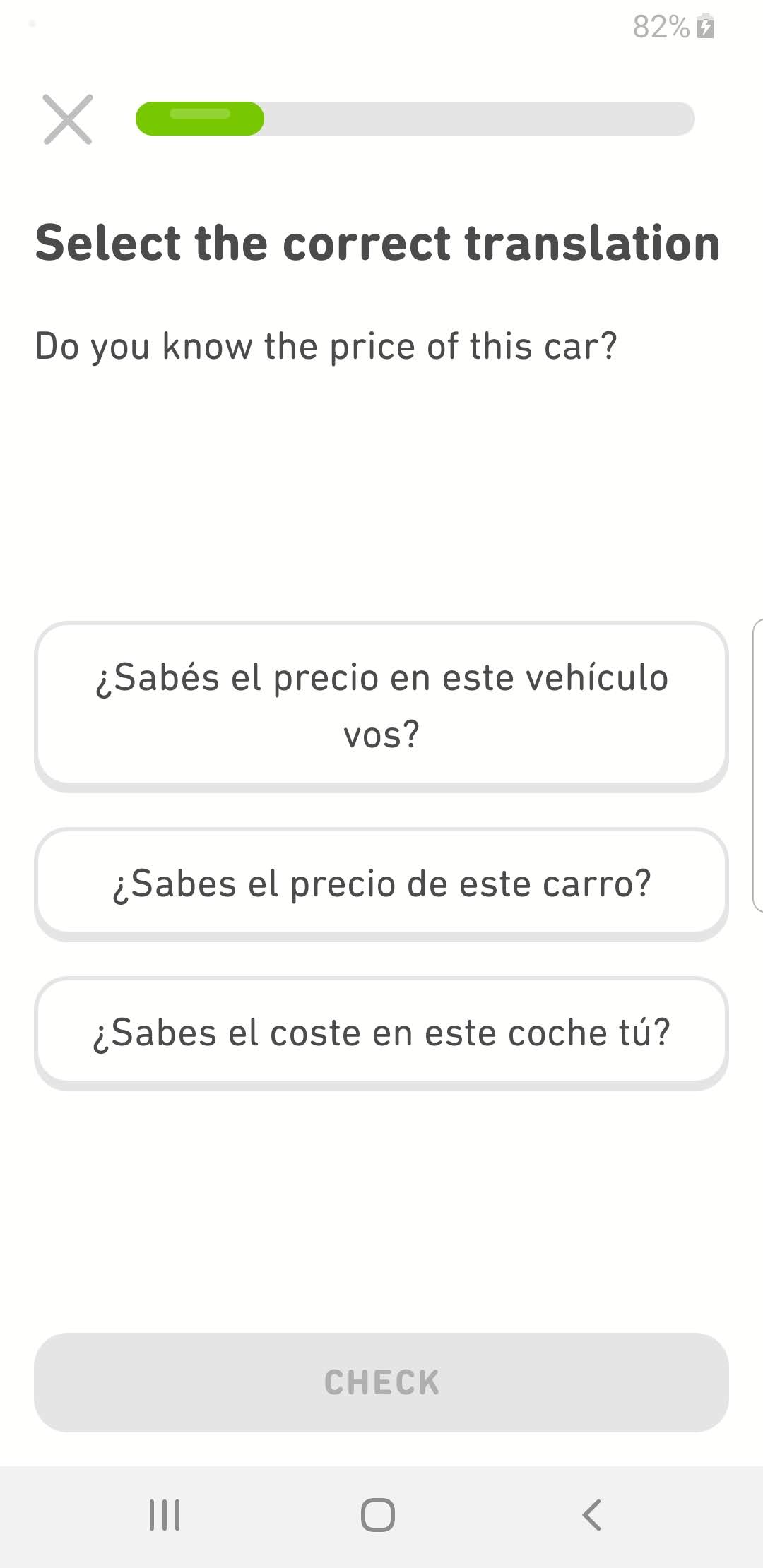
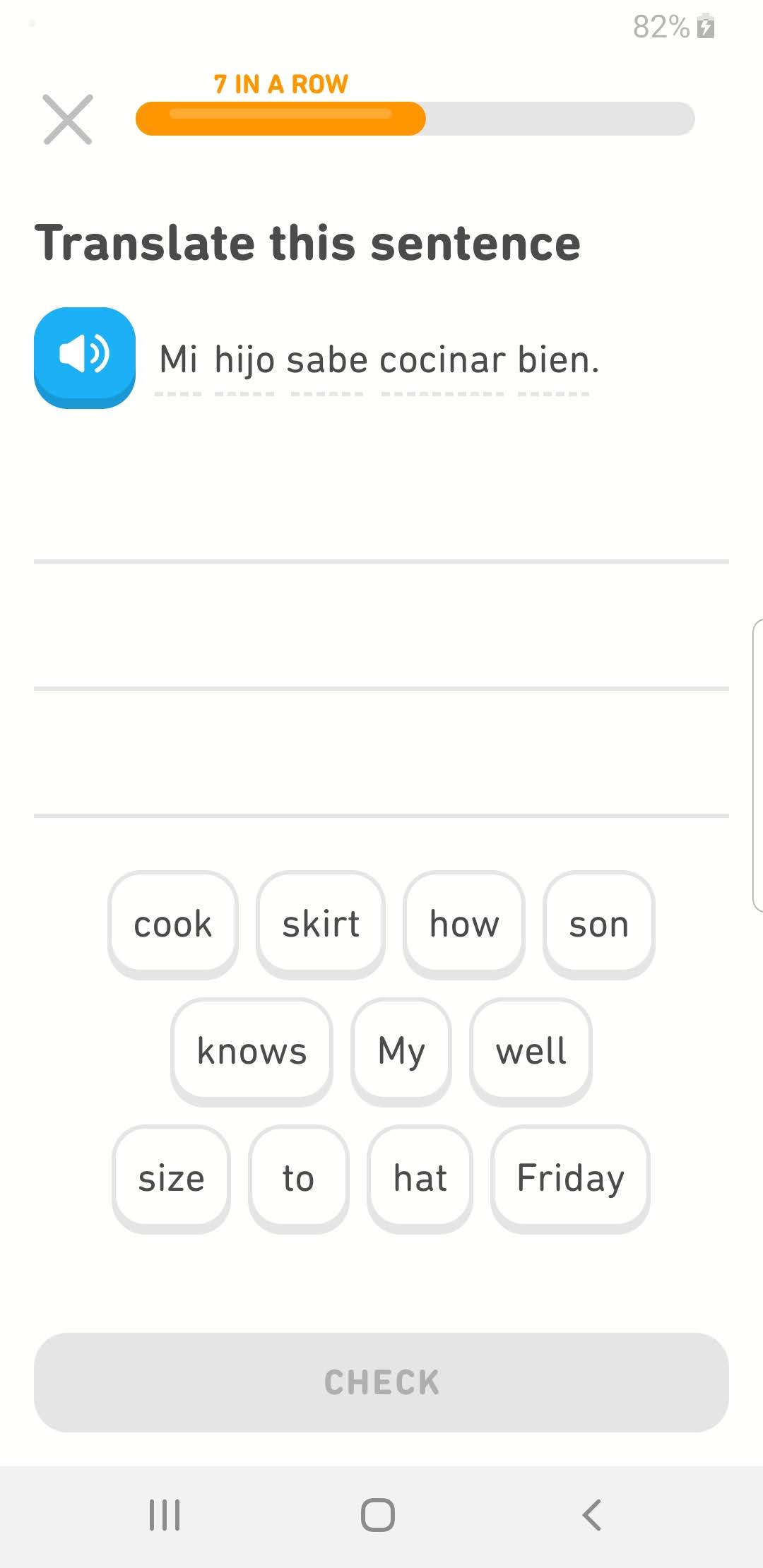

I’ve often wondered how difficult it would be to live in a different country and not speak the language. Although I don’t speak a word of Spanish (except “dos cerveza”), like yourself I would make the effort.
It’s heartening to hear how friendly the locals are!
Haha, “dos cervezas” might just be enough to get by anyway! 😉
…or “tres”… 🙂
I’d have no problem upping that number as much as we can, TunaFishTuesdays! 😉
I took 2 years of Spanish in high school, but I don’t remember much. I only know a few words now. On the other hand, my wife is a lot better. She could communicate pretty well when we visit Spanish speaking countries. If we go for a longer visit, I’d learn Spanish again. These tools sound really helpful, but I think a tutor would be best.
Salud!
A tutor is probably one of the most valuable paths for sure. I like the flexibility of the apps though in that I can do them early in the morning or late at night while Faith’s asleep. In fact, that’s how I went through the online course – late at night with my earbuds in.
Sounds like Mrs. RB40 might be able to teach me a thing or two about the language! 🙂
Have you tried Babbel app? Any thoughts on how it compares to Duolingo & Drop & others mentioned here? Way to go on your streak – very impressive dedication. Like learning to play a musical instrument, consistent, dedicated learning time is really the only way to master a new skill like this. Learning Spanish is increasingly becoming a valued skill in the US.
I tried Babbel a while back and I can’t remember why I bailed on it. I may try re-installing it once I get done with Drops just to give it another run.
I remember hearing that the US has more Spanish speakers than Spain a handful of years ago. Granted that’s not the percentage so it’s a little skewed because of the population differences between the two countries, but it’s still an eye-opener nonetheless.
I believe learning a new language is one of the greatest gifts of all. When your mind starts thinking in more than one language it’s an amazing feeling. I know it doesn’t make sense but it’s true!
One of my favorite qoutes of all time is from Nelson Mandela.
“If you talk to a man in a language he understands, that goes to his head. If you talk to him in his language, that goes to his heart.”
That is a great quote! Are you fluent or able to speak multiple languages decently then?
I’m bilangual but I guess that’s a bit cheating. English isn’t my mother tongue 😉. I am looking to learn a 3rd language and Spanish has definitely been high on my list.
P.S – for sure Faith will thank you later on in life if she ends of fluent in Spanish.
Good luck!
I doubt Faith will become fluent but she’ll probably lap both me and Lisa in due time.
A third language is crazy impressive – good luck on that one!
Like you I took Spanish in high school. When we retired a few years ago I started using Duolingo. It worked well up until I had to use the microphone and speak it. I got frustrated and gave up. I have a foreign exchange “sister” who lives in Peru and would love to have me visit someday. That is my incentive to try again. Thanks for the list of others to try!
We plan on moving to Italy in 5 years when our daughter finishes elementary school. It will be a big transition since none of us speak Italian. Though, my husband and daughter will technically be Italian citizens. We will all be taking Italian lessons. Hoping our daughter will pick it up easily. She is currently in an immersion mandarin dual language school now. She’ should be fully fluent by the time she finishes 🤞🏼
Now that’s really cool – that’ll be one awesome adventure! And, I’m sure your daughter will outshine you guys in picking up the language… such is life, right?! 😉
I really think it’s a “different strokes for different folks” kind of thing. Everyone learns differently so you have to find what works best for you. My wife uses the microphone part of Duolingo but it annoyed me so I shut it off. I don’t think that’s hindered my learning in any way since I still mumble the words to myself when I learn them… more than I would from the microphone exercise.
Good luck trying some of the other avenues – it’s nice to have some incentive! 🙂
Good for you for attempting to learn Spanish. Keep at it!
Immersing yourself in the language and culture will speed things up considerably. Have you tried banning English at home? Even when it comes to TV programs!
You’ll be surprised how fast you’ll pick things up when it’s all Spanish all the time.
That would be a good way to pick up the language. Since we’re all at different levels, I don’t know how well that would work, but maybe we could start with Taco Tuesdays… only allow speaking Spanish all day and tacos for lunch or dinner… and maybe a Panamanian cerveza for Dad at night! I think that would be something fun that the girls would get on board with. I’ll propose that this evening… thanks for the idea, Mr. Tako!
Thanks Jim!
I’m similar in having 2 years of high school spanish a couple of decades ago and having worked through duolingo. What really enhanced my spanish was taking daily classes at a “Spanish School” in Guatemala for 5 weeks. I sat down with an older Guatemalan woman who spoke little English in a beautiful garden and we chatted for a couple of hours using what little I knew and slowly grew from there. It was great!
That’s the way to do it, Aaron! It’s also another reason I wish we were a little more immersed in the Panamanian culture. Just having friendly Panamanian neighbors would make the learning more fun and probably be quicker and more effective. Nice job!
Hi Jim. Though I am not a Spanish speaker, years ago I was learning some via Rosetta Stone. At the time, courses were available for free via my then-employer (a multinational hotel chain) and it was great fun. I liked the “game” aspect of the learning model and that it wasn’t translation-based; it was all Spanish all the time.
A friend of mine IS currently learning Spanish using Duo Lingo and another method she’d made for herself: she’s a HUGE Harry Potter fan and knows the stories inside and out. So she’s reading the first book in English, one paragraph at a time, then that same paragraph in Spanish, and also listening to it in Spanish via an audiobook to help cement the vocabulary and pronunciation. It’s along the lines of what Faith is doing with her Boss Baby show, and my friend reports having success…and fun with her approach.
Oh, and speaking of Faith, nice job on the Ninja Course! It was fun to see you all in action and making the most of your lockdown, including the “out take” segment. 🙂 Thanks to you and the family for the continued insight and entetainment!
Stay healthy and safe, Damon
That’s funny because I’m actually in the middle of reading a Harry Potter book myself… maybe I should try your friend’s strategy! 🙂 I’m sure that would be a good way to learn but I don’t know if I’d have the patience to do that. Good for her though!!
I’ll pass along your kind words to Faith – that’ll bring a smile to her face.
Thanks, Damon!
“ Talking to others in Spanish. This is the most beneficial way to learn to speak Spanish, in my opinion.”
You’re on to something. I happen to agree. Check out italki.com and baselang.com. Start your first lesson and don’t look back. There will always be some amount of rote memorization when it comes to learning languages, but there is no replacement for conversing in your target language.
The site italki.com sounds familiar but I’ve never heard of baselang.com. I’ll dig into both of those this weekend – thanks for the tip, Justin!
Keep persevering, I am way from being fluent in speaking, a bit better in listening, but reading is almost easy…that is after 30 months of classes, 2 hours a week (with native Spanish speakers) supplemented by Duolingo, and any other free options. pretty painless, however you have a more urgent reason to speed things up.With coronavirus, we have switched to online classes, so you may have more options on classes than before, distance as well as face to face.
Just waiting for lockdown to end here in Europe, so I can go and practice face to face!
Take time to consider how far you have come. That first module in Duolingo was hard, now it seems so easy… Good luck
Wow, 30 months of classes – good for you, Erith! Before I started on the path of learning Spanish, I would have been surprised to hear that you’re not fluent. But that bubble was popped months ago by the Spanish professor from that Great Courses online class I took. It was like he knew my frustrations and explained that it can take years of learning and talking to others to get to that point. Although a letdown, it made me feel better about where I was and that I wasn’t a failure at the subject.
Best of luck to you on your journey – I hope the easing up on the lockdown goes smooth for you!
Our teacher explained it to us along the lines of – when you are a child you learn as your brain is also learning. Simple constructs, simple sentences. We, as adults, want to immediately speak as adults, with a full set of tenses and grown-up concepts, and we get frustrated when we can’t. If you accept that you need to simplify your thoughts, then it becomes easier. Suddenly you find that you are managing more difficult things.
That makes a whole lot of sense – it drives me nuts that I don’t know more than I do, but there’s really just so much to learn as a whole. Keeping it simple and continuing to learn seems like the best road to take.